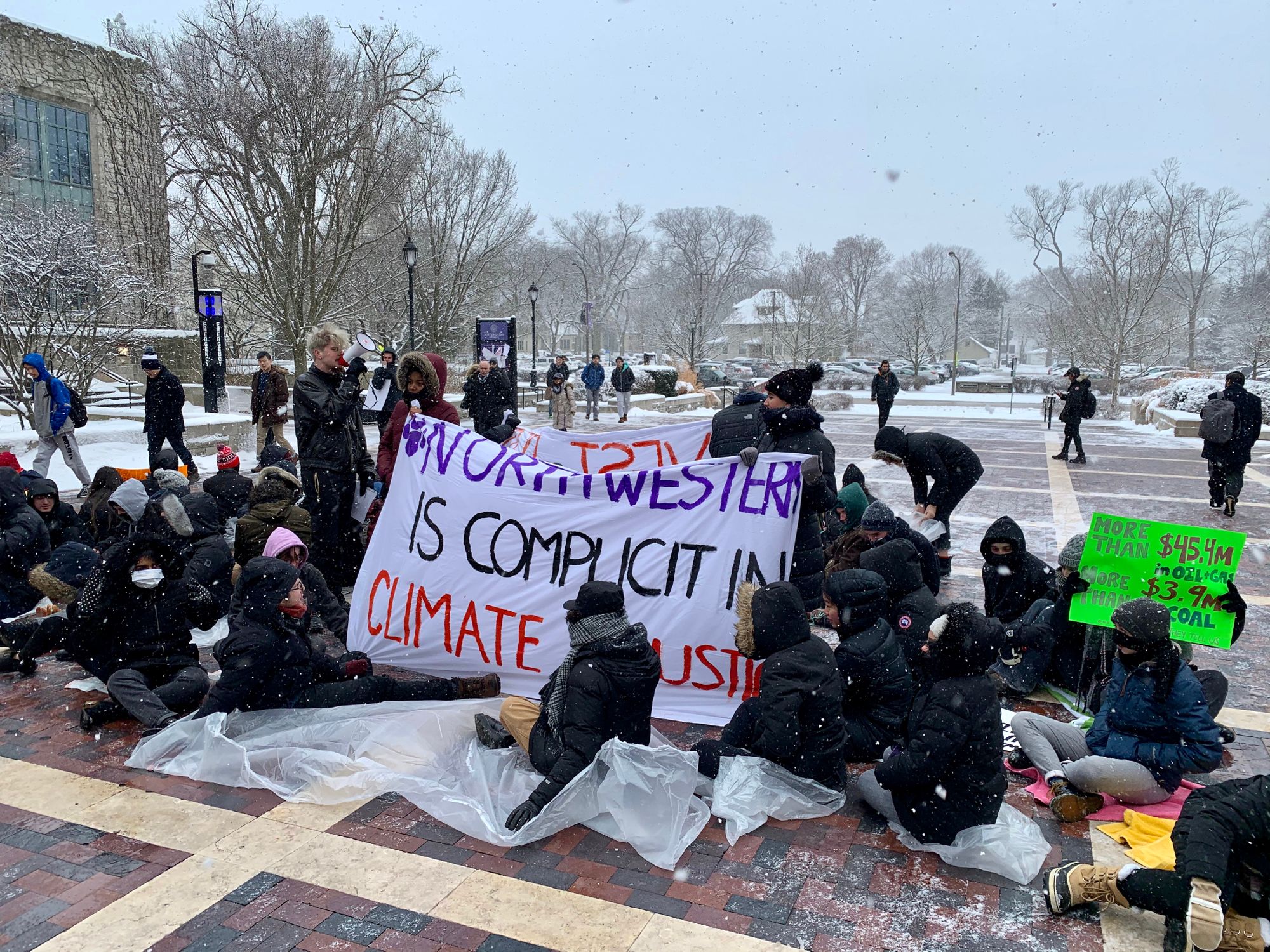
Using the platform of Fossil Fuel Divestment Day on Feb. 13, Fossil Free Northwestern staged a die-in and an environmental justice teach-in to promote its mission of calling for Northwestern to divest its endowment from fossil fuel company holdings.
Beginning shortly before noon, a group of approximately 50 students, some holding signs and large banners, marched to Tech Plaza and began laying plastic tarps on the snowy ground in front of the building. Communication senior Ross Patten led the group in call-and-responses such as “when I say climate, you say justice” and chants such as “disclose, divest or this will be our death.”
Patten read a statement that Fossil Free NU wrote and later posted on Facebook as students passed through the area in between classes, some stopping to watch or sign a divestment petition.
“Many island nations refer to the climate crisis as climate genocide as they combat the horrific outcomes of our complacency, storms which threaten their homes, their culture and their lives,” Patten said into a megaphone, reading from the statement. “Climate change will continue to disproportionately affect those least responsible, including women, people of color and the poor.”
Communication senior Grace Dolezal-Ng, the Marketing and Media director for Fossil Free NU, explained that the group donned nearly all-black coats and clothing to symbolize the lives that had been lost due to the consequences of environmental injustices. The die-in was part of a larger coordinated movement among dozens of other colleges.
“We are in coordination with a larger movement with Divest Ed, so today is technically Fossil Fuel Divestment Day,” Dolezal-Ng said. “We are acting in coordination with over 50 college campuses across the globe to try to strengthen our movement by uniting on one day.”
After the 15-minute demonstration outside, the group headed into Tech to reflect on the event. Following this, part of the group decided to take the demonstration to Norris. On the ground floor in front of the Norris C-Store, the group chanted similar phrases, and Patten read Fossil Free NU’s statement again. Some members of the more sedentary audience in Norris paused their studying or eating to watch.
The group then walked through Norbucks on the first floor, chanting and displaying their signs, before exiting the building.
Earlier in the week, members of Fossil Free NU attended a meeting of the Advising Community Investment Responsibility, wanting to know where the Board of Trustees stands on the divestment proposal that Fossil Free NU submitted to the Board through ACIR eight months ago.
“Part of our demonstration today is to show [the Board of Trustees] that we are going to continue to raise our voices and put pressure on them until they give us a response,” Dolezal-Ng said. “And we wanted to do a die-in to represent the fact that lives are already being lost because of climate change and because of this exploitation of the fossil fuel industry."
Hours after the die-in at Tech and the impromptu demonstration at Norris, Fossil Free NU continued its Divestment Day programming with a teach-in at the Graduate School Commons.
Speakers such as José Acosta-Córdova, an environmental planning and research organizer at the Little Village Environmental Justice Organization, talked about land use and how the industrial corridor in Little Village affects the community.
The night also included slam poetry and offered the approximately 130 attendees the chance to contribute to a collaborative mural.

Weinberg sophomore Olivia Stent helped organize the teach-in as the special events coordinator on Fossil Free NU’s executive board.
For Stent, the week leading up to Divestment Day served as an opportunity to raise awareness of the origins of Fossil Free NU as an organization advocating for “climate and environmental justice” in addition to university divestment from the fossil fuel industry.
“We know that there's just a lack of awareness about that, and also lack of awareness of just how people can get involved,” Stent said. “I know there's a lot of people on campus who are like, 'but what can I do?' and so this event is kind of a safe space for a lot of people to come and talk and listen to other people from all different perspectives. It's informative as well as welcoming for people to get involved and for people to participate more.”
While members of the organization continue to place pressure on the board through demonstrations and recruit community members to the cause of divestment, they are still ultimately waiting on word from the Board of Trustees.
“It's frustrating because [the Board of Trustees doesn’t] have a timeline, whereas the global crisis does,” Stent said. “But in the meantime, we're doing events like this, and we're doing protests like we did today. Anytime ACIR has an open meeting, we're going to be there and hopefully getting bodies there as well, just so they know that we haven't forgotten. This issue isn’t going away, and therefore neither are we.”